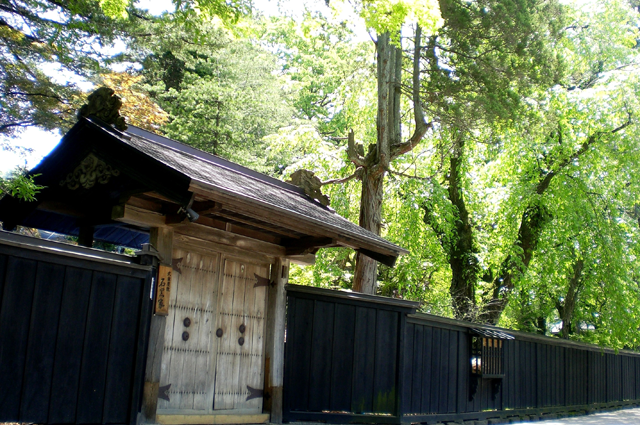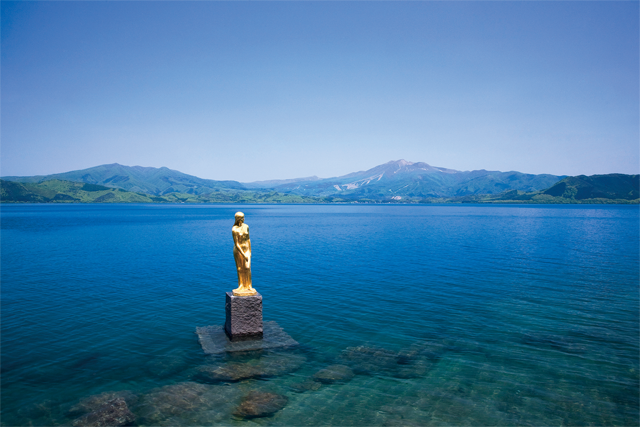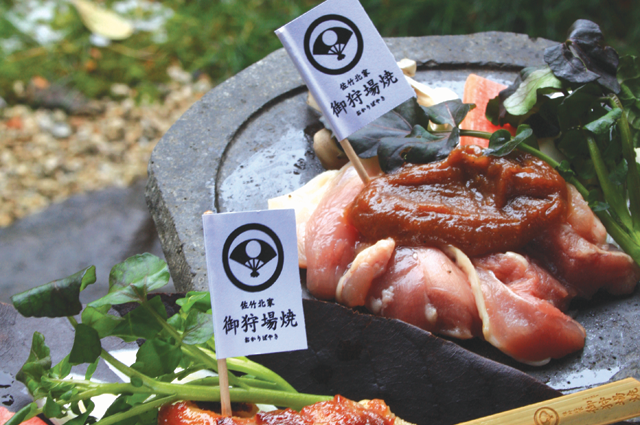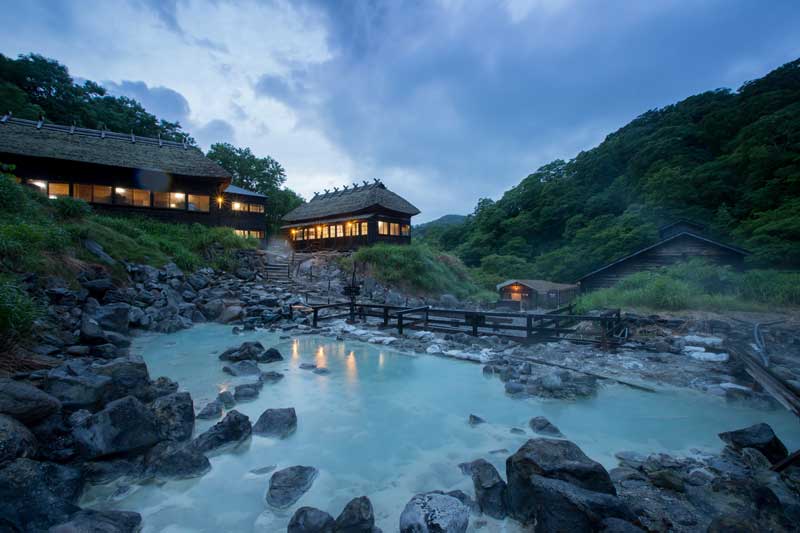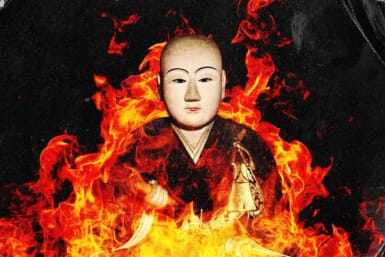Stately residences of warriors gone by and a legendary lake await travelers to this region of Akita.
Known as the “Little Kyoto” of Tohoku, Kakunodate is a historical castle village famed for its samurai houses, merchant district and weeping cherry trees in the spring.
Founded in 1620 by the Ashina Family, the area has remained largely unchanged ever since. A number of samurai residences remain intact and while most are privately owned by descendants, some are open to the public. The most impressive of them is the Aoyagi House, an extensive manor featuring artwork and weapons that have been passed down through generations. The Ishiguro House is also worth visiting for its collection of samurai armor and clothing.
Separated from the samurai quarter by the Hiyoke (Fire Shield), the merchant district isn’t quite as popular for tourists; however, it is still a charming area full of intriguing buildings. The Ando Miso Soy Sauce Brewery, in particular, is highly recommended. The brick building is not only beautifully preserved, but is also a great place to pick up souvenirs. Visitors are allowed to enter for free and sample some of the local miso and tsukemono pickles on their tatami-mat flooring.
Kakunodate is also a hanami hot spot with around a million tourists flocking to the region during the Sakura Festival in Golden Week to see the cherry blossoms in full bloom. Other festivals during the year include the Sasara Dance Festival in summer, the Shinmei, Yakushido, and Kakunodate Yamabutsuke festivals in autumn and the Hiburi Kamakura (Fire and Snow Festival) in winter.
The Lady by the Lake
The city of Kakunodate is just one of the appealing features of Akita’s Senboku region. To the north lies the area around Lake Tazawa. In addition to being Japan’s deepest lake, Tazawa is also the source of one of the region’s more colorful legends. As the story goes, Tatsuko Hime was a beautiful girl who lived close to the lake. She believed that its waters would make her even more lovely, and so she drank far more than her fill of them—so much, in fact, that the gods took offense at her greed and vanity. They transformed her into a water dragon and charged her with the grim responsibility of guarding the lake for the rest of time. Her tale has been given golden tribute in the form of a statue that sits off Tazawa’s southwest shore.
During the warmer months, it is possible to rent kayaks or canoes and go out paddling around the lake. It is an excellent way to appreciate the scenery, and the cobalt blue waters are otherworldly enough to have you imagining dragons in their depths. There are pleasant trails around Tazawa, and to the east of the lake you can find the Tazawako Ski Area if you plan to hit the slopes later in the year.
Huntsmen’s Cuisine
One dish that you should be sure to try while you are in Senboku has its origins in the rustic sustenance that the samurai would eat on their hunting trips. The Satake family of Kakunodate fame were well known for enjoying meat from their hunt quickly after taking it down. Okaribayaki—literally, “cooked on the hunting field”—is a dish that relies on the simple flavors of quality ingredients. Traditionally, it might have been prepared from game animals, but now it is made with beef or chicken, served with seasonal vegetables. The dish is given a particular kick with the addition of a special type of miso paste—sansho miso. Flavored with a uniquely flavored Japanese pepper called sansho, this spicy twist on the standard Japanese ingredient makes okaribayaki a dish to remember.
Getting There and Getting Around
Kakunodate and Tazawako are both reachable via the Akita Shinkansen. They are both about a three-hour ride from Tokyo Station. The Akita Nairiku Line is an excellent, and scenic, means of travel if you are heading north from Kakunodate.
Make Yourself at Home
Whether you’re in for a brief rest or a long-term stay, we’re sure you’ll fall in love with this hotel and ryokan pair.
Kuroyu
In Akita, onsens are seen as an extension of the earth, a source of minerals and vitamins that enrich the naturally hot water that bubbles from the ground. Situated deep in the mountains of Nyuto in Akita Prefecture, there is a stretch of onsens that remains nearly undiscovered by tourists.
Said to have been established 330 years ago, Kuroyu is the furthest onsen from Nyuto Village. The ryokan is known as a location for long-term stays, or tojiba, and is equipped with a kitchen where you can prepare all your own meals and a Japanese style BBQ for anyone to enjoy. If you’re looking to go more towards the relaxation route, though, you can have dinner served in your room.
One of the signature features of this resort, whose name translates as “black onsen,” is its black hard-boiled eggs. Fresh eggs are placed in nets and submerged in the onsen’s hot spring source to boil. After the eggs sit in the sulfurous onsen water, the hard-boiled eggs turn black on the outside from the chemical reactions. The egg on the inside remains white, and the hard-boiled eggs are said to not spoil for a long time because of the minerals that help kill bacteria.
This directly translates into what Kuroyu believes the onsen can do to help the body. The minerals in the hot spring water, rich in aroma, are believed to help heal skin diseases and detoxify the body. “Waterfalls” of onsen water are available in a separate hut near the baths to help soothe sore muscles with a natural, water-pressure massage.
014-1201 Akita-ken, Senboku-shi,
Tazawako Obonai, Kuroyuzawa 1-2-1
0187-46-2214
ryokan.glocal-promotion.com/ryokan/kuroyu/
www.kuroyu.com
Yamanote Hotel
Daisen City, in the southern inland region of Akita Prefecture, is famous for its lush natural wonders—spectacular waterfalls, sacred hundred-year-old trees, and peaceful mountain streams. It’s only fitting that such a location plays host to an equally impressive getaway—the Yamanote Hotel.
Described as a “forest resort,” Yamanote Hotel sits amongst some of the most beautiful and relaxing natural surroundings you could hope for. Let all the worries and stresses of everyday city life fall away as you enjoy a level of tranquility and relaxation that only nature can bring.
In addition to its natural surroundings, Yamanote Hotel also offers some unique onsen experiences, including mineral springs that provide both relaxation and skin beautification effects, as well as an incredible rotenburo (outdoor hot spring bath) which is surrounded by trees and offers one of the most peaceful, snow-covered views imaginable during the winter. The soft sulfate spring water is said to be able to relieve a broad range of symptoms such, as muscle stiffness and a variety of skin conditions.
After a rejuvenating day of soaking, dine at the hotel’s in-house restaurant that serves up delicious and hearty traditional dishes made from locally grown vegetables and retire to your traditional, well appointed room decorated with seasonal flowers.
Akita-ken, Daisen-shi, 67-3 Nioji Omagarinishine, 014-0072
0187-68-2001
e-gpk.co.jp/yamanote-hotel
Sponsored Post

